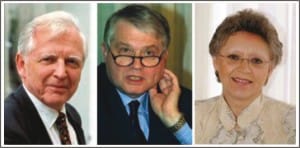AIDS pioneers and cancer scientist win Nobel prize

(L-R) German Professor Harald zur Hausen, French Professor Luc Montagnier and French virologist Francoise Barre-Sinoussi.
Two French scientists who discovered the AIDS virus and a German who bucked conventional wisdom to find a virus that causes cervical cancer were awarded the 2008 Nobel prize for medicine this year.
Luc Montagnier, director of the World Foundation for AIDS Research and Prevention, and Francoise Barre-Sinoussi of the Institut Pasteur won half the prize of 10 million Swedish crowns ($1.4 million) for discovering the virus that has killed 25 million people since it was identified in the 1980s.
Dr. Harald zur Hausen of the University of Duesseldorf and a former director of the German Cancer Research Center shared the other half of the prize for work that went against the established opinion about the cause of cervical cancer.
"The three laureates have discovered two new viruses of great importance and the result of that has led to an improved global health," said Jan Andersson, a member of the Nobel Assembly at Sweden's Karolinska Institute.
The discoveries made it possible to diagnose both infections, and led to the development of two vaccines that prevent cervical cancer, and more than 20 drugs that can keep HIV patients healthy.
The award is a decisive vote for Montagnier in a long-running dispute over who discovered and identified the virus, Montagnier or Dr. Robert Gallo, then of the U.S. National Cancer Institute.
"There was no doubt as to who made the fundamental discoveries," Nobel Assembly member Maria Masucci told news agency Reuters.
The International AIDS Society (IAS), the world's leading independent association of HIV professionals, with more than 10,000 members from 180 countries extends its congratulations to Françoise Barré-Sinoussi on a remarkable achievement as she is jointly awarded the Nobel Prize in Physiology or Medicine for 2008, and recognised for her role in the discovery of the human immunodeficiency virus, and also for her significant contribution to HIV/AIDS research.
IAS President Julio Montaner and IAS Executive Director Craig McClure jointly showered praise on Professor Barré-Sinoussi: "Françoise is deeply committed and passionate about the fight against HIV. Her work in the laboratory that led to the discovery of the virus has obviously changed the course of medical history and is an outstanding contribution to science. Her career as a basic scientist is matched by her compassion and kindness towards people living with and affected by HIV throughout the world."
Cancer discovery
Zur Hausen was recognised for finding that the human papilloma virus, or HPV, caused cervical cancer.
"More than 5 percent of all cancers worldwide are caused by persistent infection with this virus," the Nobel committee said. The virus, which infects at least half of all sexually active adults, can also cause genital warts, cancer of the penis and other genitalia.
The German scientist, who began his research in the 1970s, searched for different HPV types, detecting them in 70 percent of cervical tumor samples from around the world.
An estimated 500,000 women are diagnosed with the disease each year and about 300,000 die from it, mostly in the developing world. Zur Hausen said he thought more cancers would be linked to viruses. "I suspect there will be more in the future," he said.

 For all latest news, follow The Daily Star's Google News channel.
For all latest news, follow The Daily Star's Google News channel. 



Comments